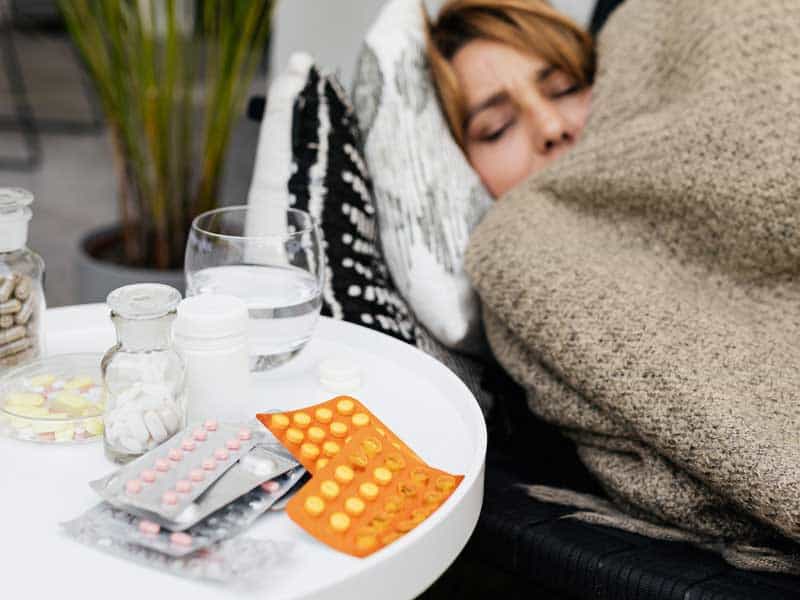Sleeping Pill Addiction
Sleeping pills are sometimes the most effective answer to sleep disorders such as insomnia. If taken safely they can improve the quality of life of users by enabling them to rest and recuperate during the night. Depending on the pill, they can help in the process of falling asleep as well as staying asleep through the night.
Unfortunately, there are some severe risks and drawbacks to using these drugs. It’s possible to become very dependent or addicted to sleeping pills, even after using them for a short period of time. The most at-risk group are individuals who take high doses of sleeping pills or those who use sleeping pills for a prolonged period of time.
Here we will look at some of the impacts of using sleeping pills, plus the indicators which could signpost a problem. Understanding the details and risks of these drugs can help you use them more safely, and accurately diagnose a problem in yourself or someone around you.
What are Sleeping Pills?
Sleeping pills come in multiple forms, some of which can be bought over-the-counter, others which are administered by prescription.
Over-the-counter (OTC) medications often contain anti-histamines such as melatonin which can induce drowsiness in the user. These sleeping pills are often considered safer as they are generally not thought to cause physical addiction. However, psychological addiction is common and can be difficult to overcome.
Some commonly used OTC substances used in the treatment of sleep disorders include:
- Benadryl (diphenhydramine)
- Unisom (doxylamine)
Prescription sleep aid substances come in a variety of forms and bring varying degrees of risk for the user. These are the forms of sleep medication that carry a risk of tolerance, dependence, and misuse. They produce a feeling of drowsiness in the user by activating the GABA response, an inhibitory neurotransmitter that slows the central nervous system (CNS). Sedative pills that interact with the CNS slow down the brain and bodily functions which can endanger the user and lead to dependency.
In some cases, antidepressants are used for their sedating effect. Additionally, they can help to manage the anxiety associated with insomnia. Despite their common use in the U.S., the Food and Drug Administration (FDA) does not currently approve them for insomnia.
Some commonly used anti-depressants used in the treatment of sleep disorders include:
- Elavil (Amitriptyline)
- Remeron (Mirtazapine)
- Desyrel (Trazodone)
Another class of prescription drugs used to induce sleep are benzodiazepines. These include:
- Xanax
- Klonopin
- Restoril (Temazepam)
- Halcion (Triazolam)
These medications are used not only for getting to sleep but staying asleep during the night. They can be used for individuals who experience sleep issues such as nightmares, sleepwalking, and wakeful sleep.
Benzodiazepines bring some of the most severe risks for the user, sometimes leading to addiction or dependency. Some users may experience intense withdrawal when they attempt to stop using. Additionally, they incur great risk if used in combination with substances such as alcohol or opioids, including overdose risk.
A further category of commonly prescribed medications includes benzodiazepine-like substances which include the following:
- Ambien (Zolpidem)
- Edluar (Zolpidem)
- Intermezzo (Zolpidem)
- Zolpimist (Zolpidem)
- Zimovane (Zopiclone)
- Sonata (Zaleplon)
These are known as ‘Z drugs’, and are used especially to help people in the process of falling asleep.

How Are They Used?
It is common for sleeping pills to be used as and when, meaning they are taken when sleeping is a problem as opposed to every day like other drugs on prescription. On some occasions, individuals will be prescribed a course of medication to use every night.
Depending on the problem, sleeping pills can be used to help the process of getting to sleep, or for staying asleep. It’s crucial for individuals to undergo a full physical and mental assessment before taking sleeping pills due to the risks associated with them. You can expect your doctor to gain a detailed picture of your sleep pattern and experiences before prescribing medication.
There are some other conditions that could lead to sleep problems and it’s important to rule these out. If you do start using sleeping pills, your doctor should ensure you are aware of the risks and best practices of use. To begin with, it is advised you start with a short course of the medication to understand how you interact with it.

Recognizing an Addiction to Sleeping Pills
Unfortunately developing a sleeping pill addiction is common, especially in those taking substances which affect the central nervous system. Both psychological and physical dependence are common. Psychological symptoms tend to include a preoccupation with the substance or a belief that you cannot live without it.
Physical symptoms tend to manifest in withdrawal when the substance is stopped. If individuals use sleep medications for any period of time they are susceptible to building a tolerance to the drug, this indicates a physical dependence.
While some dependencies develop even with the prescribed dosages of medication, others may use the drugs for other purposes than for getting a good night’s rest. The relaxing properties of benzodiazepines can result in severe addiction and dependency.
Some common symptoms of sleeping pill abuse include the following:
- Incoherent speech
- Trouble concentrating
- Unsteady movements
- Fluctuating mood
- Skin issues
- Lightheadedness
- Memory problems
- Intense dreams and nightmares
- Hallucinations
- Drowsiness
Individuals who have developed a sleeping pill addiction may feel compelled to continue taking sleeping pills without the purpose of sleeping. Instead, they may be seeking the euphoric or calming effects of the substance instead. A common indicator of sleeping pill addiction is when individuals run out of medication before they should.

Risks of Sleeping Pills
Prescription pill use can contribute to better rest, although it should be used with caution and under professional medical advice. Some of the most severe risks are the effects of sleeping pills in combination with other drugs.
Combining Alcohol and Sleeping Pills
Drinking alcohol can cause drowsiness and lowered cognitive function. Sleeping pills can result in similar effects. Using these substances together can increase the effects of each other leading to dangerous consequences. Undertaking any activities which require full cognition and attention can be extremely dangerous, such as driving, handling machinery, or being responsible for others. In some cases, mixing alcohol and sleeping pills can result in depressed breathing and even death.
Combining Painkillers and Sleeping Pills
Unfortunately, it is common for individuals living with a sleeping pill addiction to combine them with opioid painkillers. This can be related to the underlying cause of sleeping problems – chronic pain can result in insomnia – or poly-substance abuse disorders. Like alcohol, opioids can impact cognition, awareness, and respiration. Using them together can cause difficulty breathing, respiratory failure, and overdose.

Sleeping Pill Overdose
If sleeping pills are used in excess they can lead to an overdose. For this reason, it is crucial to use these substances under the care of a medical provider. The initial symptoms of a sleeping pill overdose are similar to that of alcohol and include:
- Slurred speech
- Changes in breathing pattern
- Emotion fluctuation
If you, or someone you know, develops these symptoms after using sleeping pills it is crucial to seek medical support. It is possible to experience a fatal overdose if you abuse sleeping pills.
Symptoms of a developed sleeping pill overdose can include the following:
- Loss of coordination
- Difficulty breathing
- Vomiting
- Slowed or loss of responses
- Slowed respiration
- Slowed heartbeat
- Cold or clammy skin
- A blue tinge to the lips, fingers, and skin
- Loss of consciousness
- Shock
- Coma
- Death
Parasomnia
Sleeping pill abuse can, in some cases, lead to parasomnias. This is when an addiction to sleeping pills leads to behaviors such as sleep-driving, sleep sex, sleepwalking, sleep eating, and other risky behaviors while not fully conscious.

Sleeping Pill Addiction Treatment
Although sleeping medication can be an effective treatment for sleeping difficulties, they carry great risks for the user and should be used under the guidance of a medical expert. Abusing these substances can quickly lead to dependency which can, in some cases, be fatal. If an addiction to sleeping pills develops, there are some methods that can be used in recovery.
Dose Reduction
Medical detox is generally advised in the case of sleeping pill addiction. This is usually carried out under supervision and the dose of medication is reduced using a tapering method. This is where the individual takes a smaller quantity of the substance each time they use it, gradually reducing it until they are no longer using the drug. This helps reduce the severity of withdrawal symptoms. Some people may benefit from using additional medication during this time to ease withdrawal.
Professional Treatment Advice
If you believe you may be living with a dependency on sleeping medication, seeking advice from a professional is strongly advised. Trained medical staff can approach your recovery in a holistic manner and advise you on the safest, most effective course of treatment for your situation.
Therapy
The root cause of addiction can be related to a number of things, understanding what is underneath is the most effective way of successful recovery. Some people find traditional talk therapy beneficial, while others will benefit from cognitive behavioral therapy (CBT) or dialectical behavioral therapy (DBT). These treatments can help to identify trigger points and stressors which lead to drug use. By understanding when and why you are susceptible to drug use, you can begin to tackle these problem behaviors.

Recovery at Brookdale
If you are ready to move forwards with recovery, then Brookdale treatment center may be the professional treatment provider you need. We are proud to offer our team of specialists who are trained extensively in the field of addiction and mental health.
We know that every addiction is unique and we firmly believe that every person deserves a personalized plan to help them achieve sobriety. Recovery is challenging, but it doesn’t need to be uncomfortable. At Brookdale treatment center, we provide a range of options for individuals at the start of their journey to sustained abstinence.
Addiction treatment with us includes a wide range of activities, focussing on your well-being in a holistic manner. We dedicate ourselves to ensuring that you receive the best care possible for your addiction issues.
Our team is prepared to answer calls and questions so get in touch to start your recovery process today.


